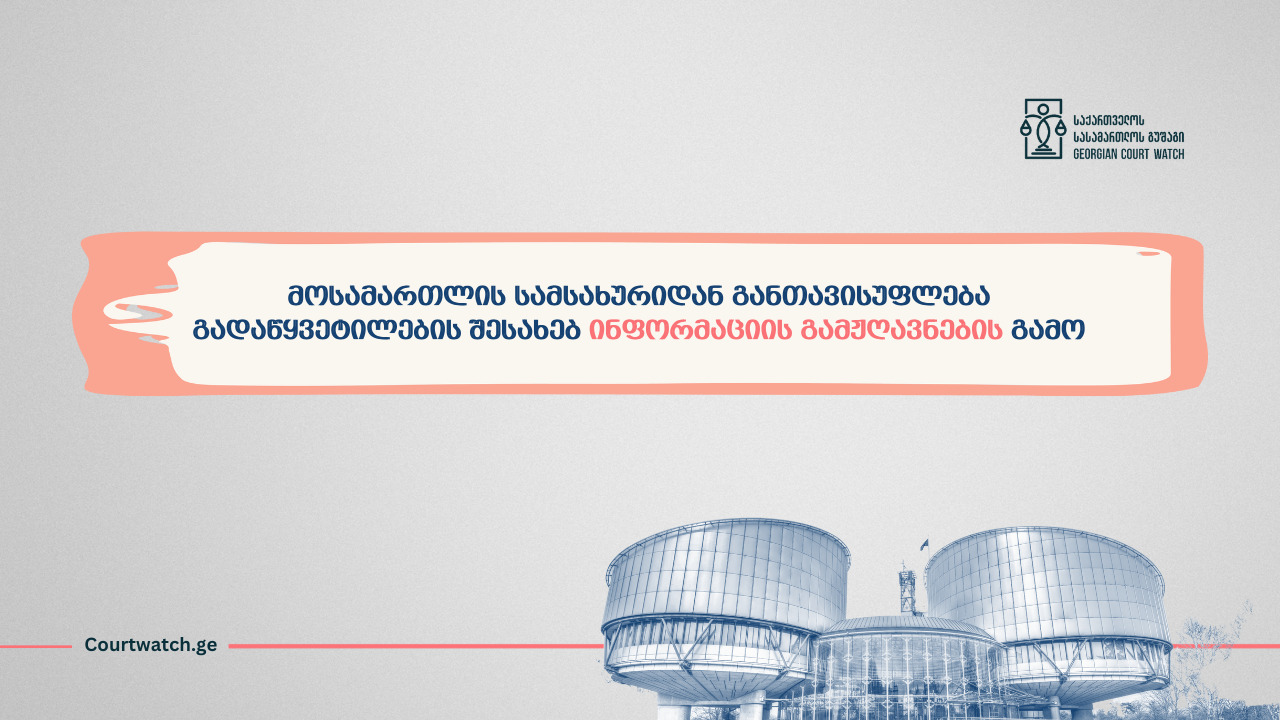Dismissal of a Judge Due to Disclosure of Information on His Decision

The appellant, Domnica Manole was a judge of Chisinau Court of Appeals. In June 2017, Chisinau Court of Appeals, with the composition of three judges, Manole among them, Dismissed the appeal of the newspaper Jurnal de Chişinău regarding the reinstatement of the appeal period in the defamation case initiated by the Moldovan Parliament. In the case, the newspaper was ordered to publish corrected information about Journal TV owned by the same media concern.
Judge Manole enclosed her dissenting opinion to the decision. Prior to publication of the full version of the Court of Appeals’ decision, a journalist from Journal TV contacted the judge. Judge Manole send a text message to the journalist, briefly explaining her arguments on the dissenting opinion. The same day, Jurnal published an article, describing a conversation with the appellant [judge Manole] and justification of her dissenting opinion.
A disciplinary case proceeding started against Manole, for making public her justification of a dissenting opinion to media. Disciplinary Committee a violation on the part of the judge and addressed the President of Moldova to dismiss the judge from her position.
In the application to the European Court of Human Rights, Manole claimed that freedom of expression was violated (application № 26360/19, Manole and Others v. Moldova - 13936/02).
On 18th of July 2023, the European Court of Human Rights found that the applicant’s dismissal had been based solely on the fact that she had disclosed to the Journal TV television channel a summary of the reasons for her dissenting opinion. The European Court It held that there had been an interference with the exercise by the applicant [Manole] of her right to freedom of expression.
The interference had had a legal basis. According to the existing Law on the Status of Judges, dismissal was the only sanction applicable to judges who had breached the prohibition on disclosing information. The Court noted on the disciplinary case proceeding, that the Disciplinary Committee enjoyed wide discretion in choosing the administrative procedure to be used in the case of a judge suspected of infringing those provisions, the possibility which, in case of Manole, it did not exercise.
In its examination of proportionality, the European Court of Human Rights noted, that the legal measures were aimed at maintaining the authority and impartiality of the judiciary. As to whether the interference had been necessary in a democratic society, the Court observed - the judge’s dismissal had been the only sanction that could be applied at the material time. It was a very heavy penalty which had put a permanent end to the career of judge Manole after 18 years of successful service. Moreover, the sanction had not followed other measures previously taken in respect of the applicant.
Following Manole’s application, the Disciplinary Committee first, and then the courts did not consider the severity of the sanction imposed on her. During the case review in the European Court of Human Rights, the Moldovan government had not presented any exceptional circumstances justified the judge’s release order.
And lastly, at the time the Supreme Court examined judge Manole’s appeal, Law on the Status of Judges, on the basis of which the sanction had been imposed on the Manole, had been amended. With these changes, the sanction for the disclosure of information related to the proceedings by a judge was eased. Considering the severity of the sanction imposed and the painfulness of the legal proceeding, the European Court found that there had been a violation freedom of expression of the applicant, and consequently, violation of Article 10 of the Convention.
Based on above, The state was ordered to pay compensation in the amount of 4,500 Euros in favor of the applicant.

Freedom of Expression of the Judges

WHAT GEORGIAN JUDGES ARE (NOT) PUNISHED FOR - THE PRACTICE OF THE DISCIPLINARY CHAMBER FROM 2012 TO THE PRESENT

The issue of "Political neutrality" concerning judicial freedom of expression































